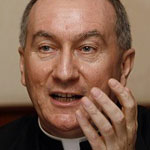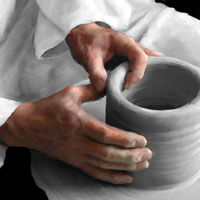Comments by the Pope’s new Secretary of State make this post timely.
As John L. Allen observes, Archbishop Parolin was only restating an official position which has been stated many times before. But, like the Pope’s remarks on the plane, we can count on sections of the press heralding this as something new and revolutionary. (Cue The Huffington Post.)
Just before this story broke, I sent the following responses to a year 12 student who is working on an R.E. research assignment. I’m glad I’m not a senior curial official, lest my words be spun as revolutionary too!
1. What is your opinion on clerical celibacy in the Catholic Church?
I have many opinions, which can be expected, I think, given the issue’s complexity.
Speaking as a celibate priest myself, I believe that well-lived celibacy is prophetic and practical. It is prophetic because it speaks to the next life, to the Kingdom of God, which transcends marriage. It also unites me more closely to Jesus Christ, who was himself celibate. It is practical because it permits me to throw myself whole-heartedly into my priestly ministry, just as Jesus was full-time in his ministry. I couldn’t do this if I was a husband and father — it would be unfair to my family, and unfair to me.
On the other hand, when celibacy is not lived well, it is very damaging. Celibacy is supposed to express love and make people more available, but if it is lived badly it can have the opposite effect. It can disfigure people, causing them to fear love, to distance themselves from other, to close in on themselves. It can cause people to live a double life, secretly engaging in illicit sexual behaviour.
Apart from all that, celibacy is often viewed by non-Catholics (and even some Catholics) as something strange and even suspicious. That’s not necessarily bad — celibacy is supposed to be counter-cultural; it’s supposed to be prophetic, and the prophetic is often discomfiting. However, it is bad that many people associate celibacy with paedophilia and other sexual pathologies, which stigmatises Catholic clergy.
2. Why do you believe that priests still practice celibacy?
There are two main reasons that the Church still practices clerical celibacy.
Firstly, Jesus was celibate, and Jesus is the model for all priests. By rights, Jesus should have married. Marriage was always highly esteemed in the Jewish tradition; celibacy was not. As a young rabbi who was observant of the Law, a wife and children would have lent Jesus a lot of credibility. So his decision not to marry must have been deliberate.
I think Jesus’ celibacy was closely related to his mission. For two or three years, he walked from town to town, teaching and working miracles. But he was always aware that this mission would culminate in his death and resurrection. He wasn’t prepared to leave a widow and children to fend for themselves.
But apart from that, Jesus wanted to reach out to every man and woman, not only in his own time, but in every age in history. He knows each one of us, loves each one of us, and wants to serve each one of us. Marriage is an exclusive relationship: a declaration of love for one person above all others. Jesus didn’t want an exclusive relationship; he was radically inclusive. His celibacy is an expression of this; an invitation for every person, of every time, to become not just his friend, but his close confidante.
Insofar as celibate priests can imitate this, they are good and holy priests, serving people on the Lord’s behalf.
Secondly, the Church still practices clerical celibacy because the Church has always practiced clerical celibacy. There has never been a time in the Church when there weren’t celibate priests. It is true that there have been times in the Church when married priests were permitted, and perhaps there are times when the majority of priests were married. But there has never been a time when all priests were married, and celibacy did not occur.
Clerical celibacy is an ancient tradition, and the Church reveres its ancient traditions. They are an integral part of the Church’s identity. If the Church was to permit married priests tomorrow, and within a generation all priests were married, a rupture would have occurred. An important part of the Church’s continuity would be lost.
3. Do you believe that the Catholic Church should continue to enforce celibacy among priests?
This is a very hard question to answer. I not only respect the Church’s teaching on clerical celibacy, but I also love it. If I did not, I would not have become a priest. My celibacy nourishes my relationship with Jesus; it is an expression of my love for him. And it empowers my priestly ministry; I am challenged every day to be more generous with the people I serve, to love them more. Even if the Church had allowed me to marry before I was ordained, I would still have chosen celibacy, because it makes me a better priest.
On the other hand, I would not object if the Church made celibacy optional. There are times in the past when celibacy was optional. There are already some priests who are married — priests from Eastern Catholic rites, and also priests who are Protestant converts to Roman Catholicism.
If I was pope, I think maybe, because there’s a lot riding on the decision to change, my answer to this question would be “Yes, the Church should continue with mandatory celibacy for priests.” But I am not pope. I am a simple country priest, so I don’t need to have an opinion on this question, and I have never formed a strong opinion. I have only a soft opinion. A soft “No, the Church should not continue to enforce universal celibacy.” But that could be readily changed to a ‘yes.’ I defer to the Holy Spirit.






There are certainly arguments for allowing married priests as an option, but my real problem with it is is that it would bring us back to 1968. Masses of Catholics are not only badly catechized , they are UN-catechized. Allowing married priests for the Latin Rite would be the same as priestesses in the eyes of far, far too many.
Wow. Hadn’t considered that. But you’re probably right!
Great read Father. I’ve been thinking about this topic for awhile. The first questions that comes to my mind are: why are we considering a change and what will it achieve? Is it a band-aid fix to increase the reputation of the Church and unite people to the Church after recent scandals? Will a change work long term?
I’m not a priest but I completely agree with your comments that celibacy make priests better priests. I also agree that without a family, a priest can perform his ministry more completely than those that are married.
However, how do we apply this concept to men and women who take the vocation of marriage? Is a married man not fulfilling his marital duties whole-heartedly if he goes to work every day? His wife might need him at home and he’s not there. The answer is probably that the man needs to work to sustain the family, but what about married couples who both work and have no children? Maybe the answer is priests can marry and still fulfil their priestly duties, just as married men who give their lives to their wives can, although they spend the majority of their time at work.
Finally, a question I struggle to answer when asked concerns married Catholic priests that have come across from the Anglican Church. I know one excellent former Anglican priest who is now a Catholic priest and is married with two kids. Is it arguable that he is not able to whole-heartedly fulfil his priestly ministry?
Great questions Dom. And great blog! I’ll add it to the blogroll in the next few days.
I won’t answer all your questions. Other readers might chime in. But I want to respond to two.
1. I would imagine that someone like you lives out his vocation primarily in being a loving husband and father. In other words, by a family life well lived. But I don’t think this is opposed to professional life. Apart from the opportunity work gives you to sanctify yourself and others (I am in Opus Dei, after all!), going to work every day can enhance your family life. It gives you and your wife space, to appreciate each other all the more. It gives your children an example of hard work, and pride in one’s work. And, as you point out, it materially provides for your family. In other words, your working career directly assists, and even constitutes part of, your family life.
That said, I agree with you that a priest could marry and still fulfil his priestly duties. This was a practical point only, not a theological or vocational one. But still, it has implications. Which brings me to the next question.
2. I think those Anglican priest converts who are married and minister as Roman Catholic priests are certainly able to whole-heartedly fulfil their priestly ministry. But it’s a different sort of ministry. They are seldom parish priests for example. They should not be expected to be available 24 hours, seven days a week, in a way that a celibate priest might be expected to. (Not constantly available obviously, but “drop of a hat” available.)
I remember reading a letter to the editor that made such a good and startling point, that I’ve always remembered it. (Not unlike Jeff’s point above.) The correspondent was an Anglican convert, who observed great differences between Anglicans’ expectations of their vicar, and Catholics’ expectations of their parish priest. If the Catholic Church was to change its teachings, and married priests became common, it would take a generation, the writer suggested, for Catholics in the pews to make the cultural shift necessary to change their expectations. And pity that first generation of married clergy, who owed their first duty of care to their family, but faced all the demands typically placed on celibate priests!
Interesting subject to reflect upon. A few questions or things to consider, a priest is in my opinion much more free to administer to the faithful if he has no attachment at home. Also priests often are the ones dealing with those of unreputable nature, or troubled lifestyle, criminals, prostitute, drug addicts, people with mental problems etc that could potentially be a threatening situation if a women or children are present as those seeking help often seek the residence of the Priest attached to the Church. Christ was celibate and is a perfect example of what it is to be a Priest. Missionary Priests are able to relocate to dangerous areas to bring the Gospel to the people and not have to worry about a family. Being a married woman with children myself, it is a full time job being a parent and wife to my husband and vice versa I cannot possibly see how my husband could see to the duties of a Priest as well as provide a stable income for a family.
I personally think that if priests were to be married and have a successful ministry, it would not work. The church tried it earlier and it failed. A priest’s attention should not be divided.
He should give his full undying attention to God and to the Church. Family also needs full attention. There is bound to be conflict. Let those who want to be married, be deacons. For those who want to be priests, they should choose celibacy. I will write again further.
I have a friend who is an Orthodox priest with parish responsibilities and a full-time secular job in order to support wife and 5 kids . . .
Also two friends whose fathers were Anglican priests – huge pressures on the kids.
Hi Fr John,
I pretty much take the same line on the issue as you do… though one practical difficulty with abandoning priestly celibacy as the norm is that parishes probably can’t afford it. Not only will they have to support a priest, but also his wife and children as well.
Now it’s one thing to ask a priest to live simply, but can that reasonably be expected of his family as well? They haven’t signed up to be clergy and can’t reasonably be required to live a greater simplicity than other families in the parish.
School fees, health insurance, extra car etc… wouldn’t all this fall to the parish as well?
It’s one thing to speak about abandoning priestly celibacy in the abstract, but no one lives in the abstract. The practical dimension needs to enter the conversation as well, and this one’s a big challenge.
Personally, I don’t see married priesthood as the great white hope of the Church and I think the issue is a bit of a red herring.
Married women going to confession to unmarried priests – personal testimony:
I confessed the sin of masturbation; the priest asked me: But aren’t you married? I said: yes, I am married. I left the confessional hurt, embarrassed. A married priest would have handled it better, I think.
Here is my point:
What has masturbation to do with my husband orgasm? Once my husband has ejaculated, meaning he had orgasm, he turned on the other side and went to sleep, leaving me in the middle of the excitement, like a bomb ready to release the energy. The emotional distress is unbearable and there is no way to release the tension without finishing the sexual act. But how? Masturbating? As long as a woman depends on the man to finish her orgasm, while the man does not depend on the woman to have his orgasm, I think that the sin of masturbation is misinterpreted here.
Would a married priest have understood better and NOT hurt/embarrassed me with his question?
Thanks for your comment Jenny!
You raise good points, which deserve serious treatment. I think the issues are firstly, the pastoral sensitivity of priests, and secondly, Catholic moral teaching.
Priests should embody Jesus’ human insight and compassion and love, especially in the confessional. I think this is achieved by good formation, and a deep interior life, and mostly importantly, grace. I don’t think, in this particular situation, it was the priest’s celibacy that let you down.
I’m sincerely sorry, Jenny, that you were hurt and embarrassed by your confessor’s conduct. I’d like to think he was unaware of what occurred, and would have immediately made amends had he realised.
As for the Church’s teaching on the issue you have raised, well, that is more complex. Of course! The confessor’s task is to inform a person’s conscience, so it’s good to review the considerations of learned thinkers.
Here is Christopher West’s take:
Vincent Genovesi concurs:
But this point is still a matter of contentious debate among moral theologians. I tend to take a more cautious line when citing “the Church’s traditional teaching.” West, I think, tends towards populism, and Genovesi, I think, is prone to overstate his claims to speak for Tradition. Still, even Germain Grisez, who is more traditional and integral in his thinking, thinks a case can be made for marital masturbation:
There are others authors, however, who do not reach this conclusion. Their writings are not so easily available online, but I think Dietrich von Hildebrand and Elizabeth Anscombe would both argue against any case for marital masturbation. I’ll have to read up on this.
(It’s interesting to note that of the five moral theologians I’ve named here, only one of them — Genovesi — is celibate. The other four — West, Grisez, Hildebrand and Anscombe — are all married.)
Thank you so much . Jenny